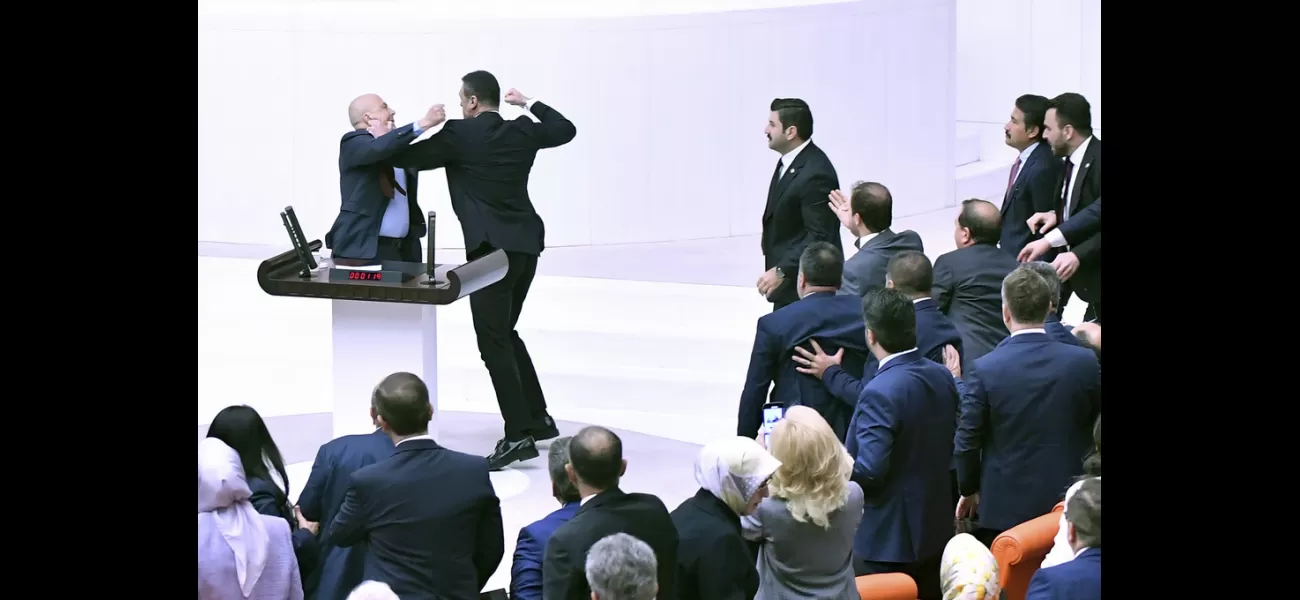Turkish politicians physically fight over incarcerated colleague during parliamentary session.
Turkish lawmakers got into a fight while discussing the imprisonment of an opposition delegate on dubious charges.
August 17th 2024.

During a heated debate in the Turkish parliament, chaos erupted as lawmakers engaged in a physical altercation over the imprisonment of an opposition delegate on what many believe to be politically motivated charges. The incident was broadcasted on television, showing Ahmet Sik, a representative from the same party as the jailed deputy, being approached and attacked by a member of President Recep Tayyip Erdogan's ruling party while giving a speech at the podium. Sik had just referred to members of the ruling party as a "terrorist organization."
The brawl quickly escalated, involving dozens of deputies and resulting in a female lawmaker getting hit and leaving drops of blood on the speaker's lectern. Another opposition member was also reportedly injured. Sadly, such physical tussles are not uncommon among Turkey's lawmakers. Ozgur Ozel, the leader of the largest opposition party, condemned the situation, stating, "It is a shameful situation. Instead of words flying in the air, fists are flying, and women are being hit."
The parliament had convened for a special session to discuss the case of Can Atalay, who had been elected as a parliamentary deputy for the Workers' Party of Turkey (TIP) while in prison during last year's election. Atalay had been sentenced to 18 years in prison for his involvement in anti-government protests in 2013, which challenged Erdogan's rule when he was the prime minister. Despite being elected, Atalay had been fighting to take his seat in parliament, which would grant him immunity from prosecution and release him from prison. He had promised to return to prison once his term ended.
Despite receiving favorable rulings from the Constitutional Court, Atalay's case had been ignored by lower courts, causing a judicial crisis and fueling a sense of injustice among his supporters. In its third ruling in Atalay's favor, the Constitutional Court had declared on August 1st that the decision to strip him of his parliamentary status was invalid. This led to opposition parties demanding a special session to discuss the case.
The conviction of Atalay and seven other defendants in the Gezi Park case had sparked widespread criticism from human rights groups and lawyers. The main defendant, Osman Kavala, a philanthropist, was sentenced to life imprisonment without parole. The European Court of Human Rights had twice called for his release, stating that his detention was arbitrary and politically motivated. The Gezi Park protests began as a peaceful environmental camp to oppose the development of a park in central Istanbul but quickly turned into a larger movement against Erdogan's authoritarian rule.
Amidst the chaos in parliament, Amnesty International's Turkey office took to social media to demand the restoration of Atalay's personal freedom and security, as well as his right to be elected, which the Constitutional Court had ruled to have been violated. After a three-hour pause, the parliamentary session resumed, with both Sik and his attacker accepting reprimands from the speaker.
The brawl quickly escalated, involving dozens of deputies and resulting in a female lawmaker getting hit and leaving drops of blood on the speaker's lectern. Another opposition member was also reportedly injured. Sadly, such physical tussles are not uncommon among Turkey's lawmakers. Ozgur Ozel, the leader of the largest opposition party, condemned the situation, stating, "It is a shameful situation. Instead of words flying in the air, fists are flying, and women are being hit."
The parliament had convened for a special session to discuss the case of Can Atalay, who had been elected as a parliamentary deputy for the Workers' Party of Turkey (TIP) while in prison during last year's election. Atalay had been sentenced to 18 years in prison for his involvement in anti-government protests in 2013, which challenged Erdogan's rule when he was the prime minister. Despite being elected, Atalay had been fighting to take his seat in parliament, which would grant him immunity from prosecution and release him from prison. He had promised to return to prison once his term ended.
Despite receiving favorable rulings from the Constitutional Court, Atalay's case had been ignored by lower courts, causing a judicial crisis and fueling a sense of injustice among his supporters. In its third ruling in Atalay's favor, the Constitutional Court had declared on August 1st that the decision to strip him of his parliamentary status was invalid. This led to opposition parties demanding a special session to discuss the case.
The conviction of Atalay and seven other defendants in the Gezi Park case had sparked widespread criticism from human rights groups and lawyers. The main defendant, Osman Kavala, a philanthropist, was sentenced to life imprisonment without parole. The European Court of Human Rights had twice called for his release, stating that his detention was arbitrary and politically motivated. The Gezi Park protests began as a peaceful environmental camp to oppose the development of a park in central Istanbul but quickly turned into a larger movement against Erdogan's authoritarian rule.
Amidst the chaos in parliament, Amnesty International's Turkey office took to social media to demand the restoration of Atalay's personal freedom and security, as well as his right to be elected, which the Constitutional Court had ruled to have been violated. After a three-hour pause, the parliamentary session resumed, with both Sik and his attacker accepting reprimands from the speaker.
[This article has been trending online recently and has been generated with AI. Your feed is customized.]
[Generative AI is experimental.]
0
0
Submit Comment





